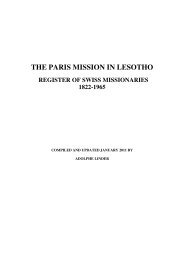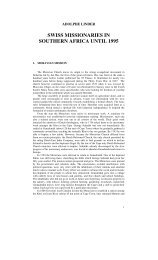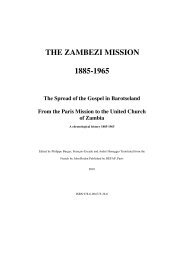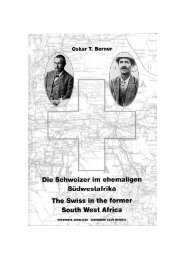THE SWISS IN SOUTHERN AFRICA 1652-1970 - swissroots-za.ch
THE SWISS IN SOUTHERN AFRICA 1652-1970 - swissroots-za.ch
THE SWISS IN SOUTHERN AFRICA 1652-1970 - swissroots-za.ch
Create successful ePaper yourself
Turn your PDF publications into a flip-book with our unique Google optimized e-Paper software.
Phlegel, Nicolas (also recorded as Siegel, David Nicolaas) born Basel 1649, soldier.<br />
19.8.1671 guilty of deserting his post while on guard duty at the Commander’s quarters,<br />
and entering the living quarters of the washerwoman Catharina of Bengal, a slave of the<br />
Company, where he stole two fresh loaves of bread whi<strong>ch</strong> another slave had stolen from<br />
the Governor's kit<strong>ch</strong>en. The misdemeanour was viewed in a very serious light since as<br />
guard it was precisely his duty to prevent su<strong>ch</strong> thefts. He was condemned to spend two<br />
successive days sitting on the wooden horse with a five pound weight atta<strong>ch</strong>ed to ea<strong>ch</strong><br />
of his legs and to 4 months hard labour on Robben Island. In addition one month’s pay<br />
was taken to cover the judicial expenses. 1 After serving his sentence he resumed his<br />
duties at the Fort, now listed as Daniel Nicolaas Siegel. 2 / 1 KAB, CJ 1, pp. 705-707; 2<br />
KAB, VC 39, Vol.2 (1672), No. 140.<br />
Rengelsba<strong>ch</strong>, Pieter born “Lauterswiel”, Switzerland [Lauperswil BE?] with 18 others<br />
guilty of mutiny on the outward bound ship Amerika. He was branded and hanged at the<br />
Cape. / Bruijn 1980, p. 151.<br />
Meyer, Jacob born “Punt in Switzerland” [Bünzen AG?] arrived 1672 or earlier,<br />
soldier, 1673 convicted for stealing brandy, punished with three lashes and five years<br />
hard labour in the quarry on Robben Island. / KAB, CJ 780: 133.<br />
<strong>THE</strong> CRIME THAT COST JACOB MEYER FIVE YEARS HARD LABOUR.<br />
On 6.1.1673 a ship at an<strong>ch</strong>or in Table Bay sent ashore an empty barrel to be filled<br />
with anis arrack (a brandy distilled in East India). Due to some delay, the full barrel<br />
could not be returned that same day and was left lying outside the Company’s wine<br />
cellar in the Castle. The sentry posted at the entrance to the Governor’s residence, whi<strong>ch</strong><br />
was on the opposite side of the courtyard, would keep an eye on it.<br />
That night Jacob Meyer was on nightshift as guard at the inner gate of the Castle.<br />
From his post he could see the brandy barrel. As the night wore on temptation grew<br />
until it became irresistible. In full view of the sentry he approa<strong>ch</strong>ed the barrel, knocked<br />
out the bung and, using his tobacco pipe, sucked out a good mouthful. Jacob was<br />
delighted with the excellent brandy and hastened to fet<strong>ch</strong> his friend Evert Faby of<br />
Amsterdam, who was on duty elsewhere. Together they returned, bringing with them a<br />
small tin pump from Evert’s kist in the guards’ quarters and two jugs.<br />
They drank their fill. Evert then remembered the sentry in front of the Governor’s<br />
residence. Instead of preventing the pilfering, that man, Wiggert Ofkens of Haarlem,<br />
had remained inactive. Full of the spirit of goodwill, Evert went over and offered him a<br />
drink – whi<strong>ch</strong> Wiggert accepted. He handed his weapon, a pike, to Evert to hold while<br />
he drank and then went over to the barrel to replenish the jug before returning it to Evert<br />
and resuming his weapon and sentry duty.<br />
Then no doubt in a very happy mood, ea<strong>ch</strong> carried away his jug full of joy-juice.<br />
When Evert arrived at the guards’quarters where he intended to place pump and full jug<br />
in his kist, he either through drunken clumsiness or boisterous spirits, woke up the<br />
soldiers sleeping there and a great party ensued, whi<strong>ch</strong> left all drunk and good for<br />
nothing on the morrow.<br />
The next day the three soldiers named were apprehended and incarcerated. All signed<br />
full confessions and were sentenced on 25.1.1673 by the Council of Justice under the<br />
<strong>ch</strong>airmanship of Governor Goske. The council viewed Wiggert’s action of abandoning<br />
his sentry post and weapon to an unauthorised person in a very serious light, whi<strong>ch</strong><br />
demeanour was aggravated by neglecting his duty of preventing the criminal opening of<br />
the barrel and later by making himself party to the crime by also tapping and drinking<br />
therefrom. Nevertheless, the Council did not wish to apply the full vigour of the law but<br />
rather to deal leniently with the prisoner. The lenient sentence pronounced was that<br />
Wiggert be brought to the place of execution where he was to be tied to a pole with the<br />
hangman’s noose around his neck and to be severely scourged; then to be sent to<br />
Robben Island to labour on public works for ten years. Jacob Meyer and Evert Faby, for<br />
stealing the brandy and seducing others to do the same, were to be given three lashes<br />
and then sent to Robben Island for five years. All the savings whi<strong>ch</strong> they had<br />
34







